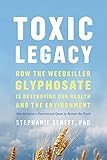For today’s book review: Toxic Legacy: How the Weedkiller Glyphosate Is Destroying Our Health and the Environment.
I have followed Stephanie Seneff’s work on glyphosate for years now. I cited her work in our book, Thiamine Deficiency Disease, Dysautonomia and High Calorie Malnutrition, and in many of the articles where I have written about the ills of glyphosate. Her work on glyphosate is seminal and the foundation for much of my understanding, of not only this chemical, but of the industry itself. Because of that, I thought I knew much of what she would write in this book. I was wrong. There was so much more to understand about glyphosate’s mechanisms of destruction than I anticipated, all of which she adroitly takes us through.
Glyphosate is truly one of the most underappreciated culprits to modern disease. The mechanisms by which it exerts its ill-effects on health are vast and include glycine substitution, mineral chelation, microbiome destruction, phosphorylation disruption, sulfation errors, and on and on. These are some of the most basic and fundamental processes for organismal survival. Consider just one of its deleterious actions: glycine substitution. Glyphosate is an analogue of the amino acid glycine.
“Nearly every protein of any length has at least one glycine residue. There are a large set of proteins for which at least one specific glycine residue is essential for proper function.”
Collagen is one of those proteins and it is a big one. It happens to comprise up to 25% of all of the body’s protein. It turns out that every third residue of the collagen protein contains a glycine reside. What problems might ensure when glyphosate fills those position? Might some of the joint pain so many of experience be related to glyphosate substituting itself for glycine in collagen?
This is just the tip of the glyphosate iceberg, albeit a huge one.
If you like mechanisms and want a deeper understanding of why so many of us are fighting so many complex and chronic illnesses, this book is for you. The chemistry is complicated, but Dr. Seneff does a remarkable job making it accessible and easy to understand, even for the lay person.
I have to say, Toxic Legacy: How the Weedkiller Glyphosate Is Destroying Our Health and the Environment, by Stephanie Seneff, is one of the best science books I have read in a very long time. I highly recommend this book. If you purchase it through the link below, I get a few dollars that help support this website. Enjoy.

You Save: $ 7.92 (-40%)
Price: $ 12.08
Price incl. VAT., Excl. Shipping
Last updated on October 19, 2023 at 10:38 pm – Image source: Amazon Affiliate Program. All statements without guarantee.
We Need Your Help
More people than ever are reading Hormones Matter, a testament to the need for independent voices in health and medicine. We are not funded and accept limited advertising. Unlike many health sites, we don’t force you to purchase a subscription. We believe health information should be open to all. If you read Hormones Matter, like it, please help support it. Contribute now.













